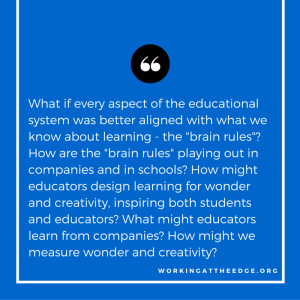 In an earlier post, I wrote about the one change educators can take to move our classrooms toward inquiry – problematizing practice. The most engaged leaders are never comfortable with the status quo. They continuously think of ways to improve aspects of practice and begin the journey of change by modeling powerful questioning.
In an earlier post, I wrote about the one change educators can take to move our classrooms toward inquiry – problematizing practice. The most engaged leaders are never comfortable with the status quo. They continuously think of ways to improve aspects of practice and begin the journey of change by modeling powerful questioning.
This week I’m in Silicon Valley with a group of educators connected with Penn’s Midcareer Doctoral Program in Educational Leadership, studying the intersection of and dynamics between education, innovation and entrepreneurship. To start our week-long journey, which includes conversations with entrepreneurs from education start-ups, visits to innovative schools and additional conversations with faculty from Wharton San Francisco, we gathered this first day to share our interests and generate powerful questions.
Some of the curiosities and questions that emerged from our rich conversations today:
- What if every aspect of the educational system was better aligned with what we know about learning – the “brain rules”? How are the “brain rules” playing out in companies and in schools? How might educators design learning for wonder and creativity, inspiring both students and educators? What might educators learn from companies? How might we measure wonder and creativity?
- According to the software company Intuit, 40% of the workforce by 2020 will be contingent workers – those who act as independent contractors, temporary employees and the self-employed. As the workforce changes, what knowledge, skills and attitudes that are uniquely human will workers need to achieve success in a new economy? How is the relationship between content knowledge and soft skills changing with the increase in access to content through technology? How are educational institutions providing opportunities for learners to develop new knowledge, skills and attitudes? How can the world of start-up companies help educators better understand what students will need?
- How might educators and educational start-ups better connect and collaborate to design the best solutions for learners and educators? What assumptions do educational start-ups bring about the K12 space to the development of products? What assumptions do educators bring about educational start-ups? What if we understood each other’s work better?
- Uber is a reliable, low-cost way of travel that has disrupted the taxi industry. What will be education’s “Uber” – education’s disruptor?
- What is the role of leadership in making any ideas for disruption to the current system a sustainable reality? How does leadership create the structures and culture to support disruption?
These are some powerful questions from a diverse group of educators willing to problematize their practice and eager to connect with others to explore possibilities for changing the face of teaching and learning. This group of leaders is not satisfied with the status quo and dreams of better for students and staff. I’m looking forward to seeing how the inquiries unfold over the days ahead and the takeaways we share at the end of this journey.
Through the lens of your own practice, what questions do you have around education, innnovation and entrepreneurship?
Connect with #PennSV16 on Twitter and on Voxer. Connect with Randy on Twitter and on the TLTalkRadio podcast!
Get new content delivered to your inbox and the ebook 3 Key Principles of Digital Transformation. The ebook contains valuable information from my experience leading a digital transformation and working with a variety of stakeholders over the past decade.
- A silver lining - January 22, 2022
- Is our use of tech working against us? 🤔 - September 8, 2021
- What’s NOT going to change in the next 10 years? 🤔 - September 7, 2021
Hope you’re enjoying the California sun on your visit! I have a question that aligns with one of yours and will use your analogy as part of it. How can public education policy makers, a.k.a. politicians, get out of the way of the “education’s Uber(s)”?